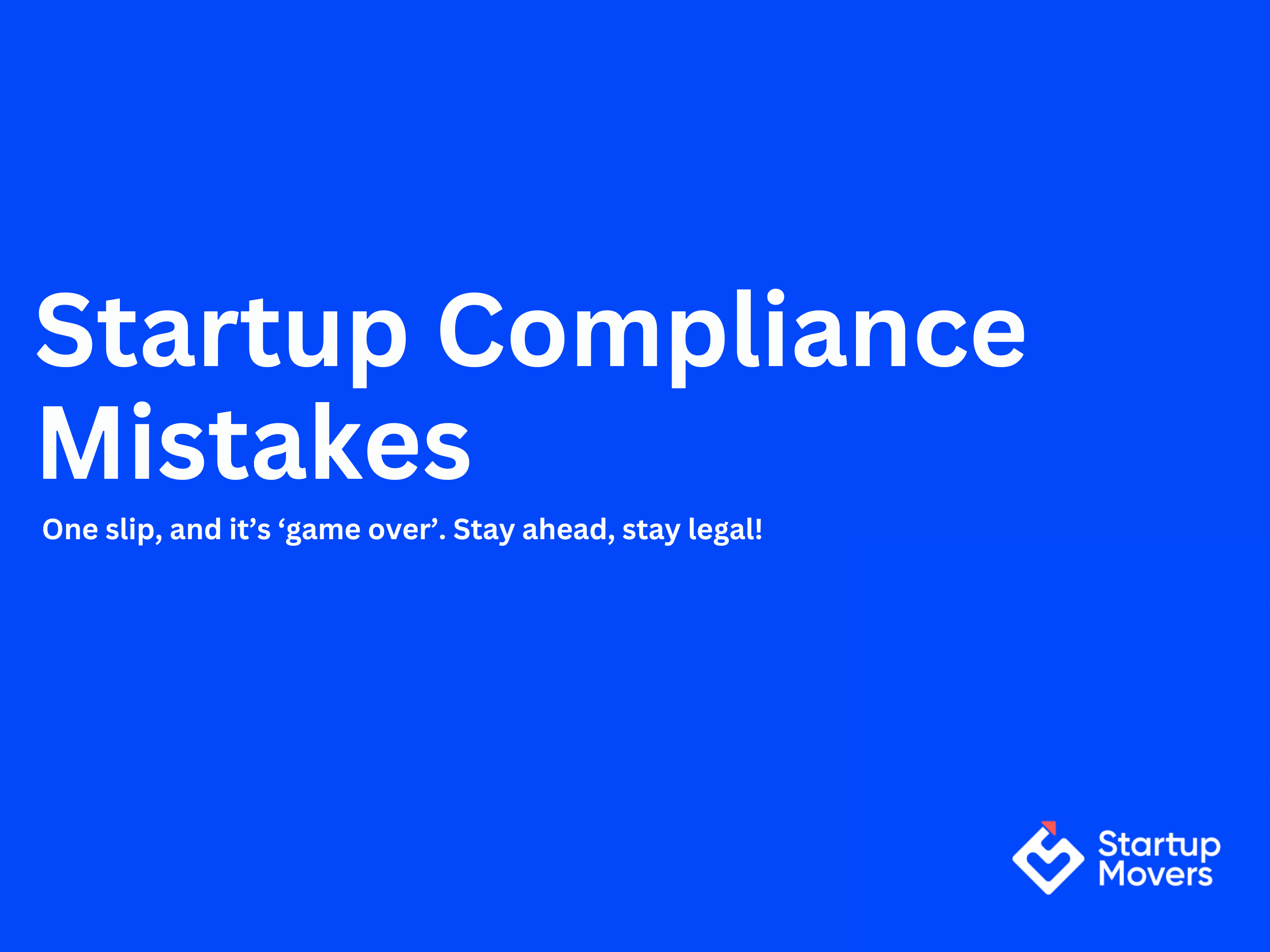Understanding Softex Filings




Compliance errors are silent killers for startups. Unfiled taxes, improper employee contracts, and regulatory fines can bleed resources dry. Missed deadlines, data breaches, and ignored licenses jeopardize funding and operations. Avoid these mistakes small business owners make with a clear strategy.
In this blog, find out how to avoid the pitfalls and rise above the rest.
Startups face numerous hurdles, and one of the biggest is staying compliant with ever-evolving laws and regulations.
A recent survey by the U.S. Chamber of Commerce revealed that nearly 40% of small business owners struggle with understanding and meeting compliance requirements.This confusion can lead to costly mistakes such as missed filing deadlines, data breaches, or unpaid taxes.
In this blog, we’ll explore the most common compliance mistakes that startups make and provide actionable insights on how to avoid them—so you can ensure your startup not only survives but thrives in today’s competitive environment.
Startup compliance is the process of meeting regulatory, financial, and operational requirements. From registering your business legally to adhering to data protection laws, compliance ensures your business operates lawfully and sustainably.
Startups often focus on growth and innovation, but neglecting compliance can have severe consequences. Here’s why maintaining compliance should be a top priority for any business:
Globally, businesses incur billions annually due to fines for non-compliance with financial, data protection, and tax regulations. In fact, the global cost of compliance breaches is estimated to be over $2 trillion annually.
These penalties drain resources and severely impact profitability, making compliance a financial necessity.
According to a 2019 survey by Deloitte, 59% of consumers stated that they would stop doing business with companies that fail to protect their personal information.
A damaged reputation can lead to loss of customers, reduced market share, and long-term brand harm. Maintaining compliance builds trust and credibility, which are critical for customer loyalty and retention.
A report by PitchBook indicates that compliance issues are one of the top reasons startups fail to secure funding.
Without proper compliance measures in place, your startup risks missing out on valuable investment opportunities that could be pivotal to scaling the business.
A study by the Small Business Administration (SBA) found that 20% of startups fail within their first three years, often due to poor operational management and non-compliance.
Compliance isn't just about avoiding fines—it's about building a foundation for sustainable growth, trust, and long-term success.
Unlock smoother operations and seamless scalability with compliance done right
Get on a 1:1 call with usA rapidly expanding fintech firm in Europe ignored GDPR (General Data Protection Regulation) compliance, leading to a significant €250,000 fine. The company’s failure to protect customer data not only resulted in financial penalties but also caused widespread customer distrust. As a result, many users fled the platform, and the brand's reputation suffered a severe blow.
Lesson Learned: This case underscores the importance of prioritizing data protection, especially for businesses that handle sensitive financial information. Non-compliance with GDPR can lead to substantial fines, loss of customers, and long-term damage to a brand's credibility.
A food startup in India failed to obtain proper FSSAI (Food Safety and Standards Authority of India) certification before launching. As a result, the business faced a complete shutdown of operations, leading to significant financial losses. The oversight not only hurt revenue but also severely damaged the brand’s reputation among consumers.
Lesson Learned: Licenses like FSSAI are non-negotiable for food businesses in India. Prioritizing regulatory approvals before launch can save startups from costly operational disruptions and reputational damage. Compliance is essential for smooth business operations and long-term growth.
Here are some key strategies to protect your business and ensure compliance.
Example: Zappos integrates compliance into its company culture, ensuring employees prioritize regulatory adherence. This strong culture minimizes errors and builds trust, contributing to operational efficiency.
Example: FreshBooks uses automated tools for invoicing, tax calculations, and reporting, reducing errors and simplifying compliance. This approach helps businesses stay up-to-date with regulations while minimizing manual work.
Example: Airbnb consulted legal experts to navigate local laws, zoning regulations, and contracts, ensuring compliance with tax and safety regulations. This early legal advice helped prevent future legal challenges.
Example: Dropbox established clear policies and regular audits to maintain compliance with data protection laws like GDPR. This robust framework helped them protect user data and maintain brand trust.
Don’t wait until it's too late. Let’s fix those compliance issues before they become problems
Get It right!Startups often face hurdles with compliance. Here’s a recap of the four most common compliance mistakes and how to avoid them:
To help you steer your startup in the right direction and make compliance your strength, here’s a concise overview of key takeaways and a practical action plan.
|
Key Takeaways |
Action Plan |
|
Compliance is Crucial |
Ensure you have a compliance-first culture, with monthly check-ins and regular updates on industry regulations. |
|
Financial Oversight is Non-Negotiable |
Implement automated financial tools for tax filings, payroll, and audits. Hire a CPA or financial advisor to streamline processes and avoid costly penalties. |
|
Data Protection Should Be a Priority |
Invest in cybersecurity tools like encryption and backup systems. Create a solid data privacy policy and train your team to handle sensitive information. |
|
Regulatory Compliance is Ever-Evolving |
Subscribe to industry-specific newsletters and set up automatic alerts for regulatory updates to stay ahead of the curve. |
Future-proof your startup with seamless, strategic compliance
Don’t Wait—get compliant today!Non-compliance can cripple your startup—resulting in hefty fines, reputational damage, and even legal shutdowns. This blog highlights the most common compliance mistakes startups make and offers actionable strategies to help you stay ahead, protect your business, and thrive in a competitive landscape.
Building a business is hard work, but staying compliant shouldn’t be. Let our team of experts guide you through the maze of legal requirements and regulatory pitfalls. Whether it’s data security, tax filings, or labor laws, we’ve got you covered. Reach out now and put your business on the path to sustained success!
Q. What are the most common compliance mistakes startups make?
Startups often overlook legal frameworks, neglect data security, mismanage finances, and fail to keep up with regulatory updates. These mistakes can lead to costly penalties, reputational damage, and even business shutdowns.
Q. How can I avoid costly compliance mistakes in my startup?
To avoid common compliance pitfalls, build a compliance-first culture, leverage technology to automate tasks, engage legal experts to navigate complex regulations, and set up a robust compliance framework.
Q. What legal structures are best for startup compliance?
Choosing the wrong legal structure can lead to costly issues down the line. The right structure—whether a limited liability company (LLC), corporation, or sole proprietorship—depends on your business type, goals, and liabilities.
Q. What are the penalties for failing to meet startup compliance regulations?
Penalties for non-compliance can range from hefty fines and legal fees to the suspension or closure of your business. The consequences vary by industry and region, but the financial and reputational damage can be devastating, especially for new startups.
Q. What should I do if I realize my startup has missed a compliance requirement?
If you realize that your startup has missed a compliance requirement, act quickly. Rectify the mistake by filing necessary documents, paying fines, or taking corrective actions. Contact legal or compliance experts to help resolve the issue and implement systems to prevent it from happening again in the future.
Don’t let compliance confusion slow you down. Our experts are ready to help you navigate any legal hurdles.
Ask our experts now!
